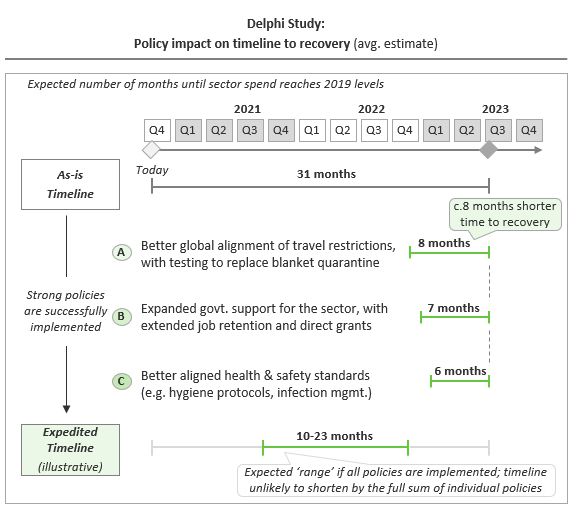January'21 Message from the CEO

Daniela Otero
CEO Skål International
We turned the page of the calendar and we are already in 2021!
The year 2020 has left us a long list of things to reflect on... we hope that it has also given us the ability to rethink the future, as the consequences of everything that has happened have shown that we were not prepared for a crisis of this magnitude.
Governments, organisations, businesses and ultimately all of us... will need to invest the next few months in more training focused on recovery.
Working together and collaborating has been, and will continue to be, vital!
Access to information remains key to planning and subsequent decision-making. That is why I would like to share with all of you some interesting points from a recently published document, the 'Manifesto for a safer, greener and smarter Tourism', based on contributions of key industry experts who have participated in a Delphi study.
That report is based on recommendations from the UNWTO and the WTTC where ideas and proposals are developed around 5 areas that will be crucial to restart the global travel and tourism sector, shorten the time for recovery and ensure sustainable growth in the long term.
These are some of the highlights of the study:
1. Globally Aligned Travel Restrictions
Delphi study participants perceive the current “plethora of local, regional and national travel restrictions” as a major hurdle for a rebound of the global travel sector and call for globally-aligned travel restrictions based on common, evidence-based risk assessment. Pre-travel passenger testing from ‘at risk’ countries or regions, supported as much as possible by on-arrival testing in the destination country, should replace the great number of fast-changing unilateral travel restrictions, including the currently often used blanket quarantine rules on inbound travellers from certain geographies. Changes in travel restrictions should be communicated swiftly, but some (at least minimal) ‘notice period’ before new measures are introduced should be given to allow for planning among travellers and businesses. In the short-term, prior to globally-aligned travel restrictions, experts strongly support the creation of air corridors and ‘travel bubbles’.
2. Global Health & Safety Protocols
Global health & safety standards are widely seen as a prerequisite for any significant turnaround in the global travel & tourism sector. Experts participating in the Delphi study expect that globally aligned standards could shorten the timeline to recovery by up to six months.
WTTC and UNWTO have published detailed guidelines, which are widely supported by industry experts. This manifesto calls for three core topics to be addressed: Operational and Staff Preparedness, Ensuring a Safe Experience, Rebuilding Trust and Confidence.
3. Continued Government Support
Given the deep decline in 2020, long duration of the crisis and the second wave in COVID-19 infections, continued government support is seen as crucially important by the Delphi experts. Ideally, government support should be more targeted at the travel & tourism sector and cover all types of players in the eco- system, with specific programmes targeted at SMEs and larger companies.
Key priorities are (in order of ranking):
Extended and improved job retention schemes that also address workers in informal employment, direct grants, ideally for specific needs and/or targeted at specific type/size of companies.
More generous exemptions from taxes, fees and other payments (e.g. VAT, travel-specific taxes).
Stronger collaboration and cooperation between the private and public sector.
Given the higher importance of domestic tourism, especially short-distance tourism, experts are also asking for more public sector involvement in marketing and advertising for local tourism.
4. Smarter, Seamless Travel Experience
Smart travel technology and seamless travel experiences are widely seen as potential drivers for the travel & tourism sector to overcome the current crisis (e.g. touchless and public health solutions). However, these are also longer-term initiatives that will shape the industry in the coming years, significantly improving the traveller experience.
Delphi participants highlight several areas as of high interest:
Data analytics and personalisation.
Biometrics and digital identities, and seamless traveller journey.
Virtual assistants and virtual travel experience.
Implementation of new tech solutions is however often held back by the lack of clearly visible ROI, and the ‘survival mode’ many companies find themselves in due to the COVID-19 crisis.
Experts suggest that improved public sector involvement (e.g. incentives for implementing specific technologies, cooperative/sponsored research projects) and better information on benefits and best practices could significantly speed up the transition to smarter and seamless technology.
5. A More Sustainable, Resilient and Inclusive Travel & Tourism Sector
Participants of the Delphi study forecast that the current COVID-19 crisis will further increase the relevance and urgency of sustainability topics. The pandemic is generally seen as a ‘reset’ providing overall positive effect on sector sustainability. While a majority expect that they will focus more on sustainability in the coming years, 2/3 also fear that immediate investments will be postponed due to the current crisis.
Participants prioritise initiatives around decarbonisation and carbon removal, destination stewardship/community engagement; including ‘slow tourism’, and action against human trafficking and wildlife trafficking. Participants are also strong advocates for concrete next steps to ensure the sector can achieve these sustainability goals, e.g. high interest in sustainability guidelines as well as sustainability monitoring and reporting.

While all participants of the Delphi study agree that there will be no easy route to recovery, industry leaders voiced their expectation that policy areas discussed in this manifesto have the potential to significantly shorten the timeline to recovery:
Better global alignment of travel restrictions, with testing to replace blanket quarantine rules, if implemented swiftly, could shorten the timeline to recovery by up to 8 months.
Expanded government support for the travel & tourism sector, with extended and improved job retention scheme and grants to bridge liquidity shortages: up to 7 months.
Better aligned health & safety standards, up to 6 months.
It is crucial to emphasise participants’ expectations towards alignment and harmonisation of travel restrictions and safety standards and continued strong government support in these difficult times.
